You have /5 articles left.
Sign up for a free account or log in.
Following the vote of the Evangelical Lutheran Church in America (ELCA), to which Augustana College is related, to permit public rites performed by its pastors that celebrate and support committed same-gender relationships, I knew it was only a matter of time before a request would come for use of the college’s chapel by a same-gender couple.
I was surprised that it took more than two years, but this fall two such requests arrived. ELCA policy requires a congregation’s consent before same-gender weddings can be performed. Because Augustana is a church-related institution, not a congregation, the local bishop determined that it was up to me as president of the college to decide.
Such a decision might seem difficult. A decision to welcome same-gender couples is bound to disappoint some faithful alumni and friends. At the same time, a decision not to do so would disappoint many students and faculty, as well as some (other) faithful alumni and friends.
For me, however, the decision to permit these weddings was an easy one. As a lawyer and as a college president, I am committed to civil rights, including the rights of gay and lesbian persons. I had been active in a successful effort to prohibit discrimination on the basis of sexual orientation at our local Boy Scouts of America Council. When I came to Augustana 10 years ago, I wanted to give meaning to the college’s existing assurance to students and staff that they would not be discriminated against based on their sexual orientation. Would these non-discriminatory statements simply end at the chapel door?
So there was no question in my mind that I would permit same-gender weddings. But questions remained. How should I engage the board? How would we announce the decision? And how would we respond to those disappointed with the decision?
The most difficult part of the process for me was to ascertain the degree of board involvement in the decision. In one sense, it was a relatively small matter — same-gender weddings are permitted by our church body, and we would likely have only a handful each year because our policies permit only alumni, students, employees and children of employees to be married in our chapel. On the other hand, while this hugely symbolic move demonstrates our commitment to diversity, it also might play into the fear of some of our alumni that the college is “too liberal” or straying too much from its traditional roots. Usually boards should be involved in matters of policy. But given our longstanding non-discrimination stations, and the ELCA’s position, was this a policy shift?
I liked the idea of making the decision myself to avoid a contentious debate at the board level. Knowing some would react negatively, I wanted their target to be me and not Augustana College. In the end, our local bishop had made it easy by ruling that the decision was mine. Nonetheless, I conferred with board leadership; all agreed that while trustees should be kept informed, it was not a matter for the full board.
I had not planned to publicly announce my decision given that the chapel’s use is not public. But once I informed a faculty meeting that I had made this decision, it was shared within hours on Facebook and various blogs. We issued a statement to the campus community in part to clarify questions that subsequently arose, and this proved helpful when local and national media got wind of a church-related school opening its chapel to same-gender couples.
Support for the decision has been overwhelmingly positive. But, as I expected, a few have been disappointed; one alum sent a blank pledge card back with a copy of the USA Today article mentioning the decision. For every protest, I have received at least a dozen encouragements, not just from students and colleagues, but from a surprising array of alumni. To the handful of persons announcing their withdrawal from the life of the college, I offer a personal response, first by thanking them for contacting me, then offering my rationale and finally acknowledging that reasonable minds can differ.
Most importantly, I acknowledge that not long ago I might not have made the same decision. In the past decade my views have been changed because of discussions with my children, with our students, and with our LGBT employees. We can learn from those who are younger than we are and have fresher, less hide-bound perspectives. I expect critical thinking of my children and my students, and I expect them to challenge opinions of others, even their elders, when they are passionate about something. And we can learn from those from the LGBT communities who have, as an extraordinary act of faith, created loving and committed families despite the censure of state and church.
As a president, I like to be decisive, but I also like to avoid controversy where I can. I follow the school of thought that a president has very few “silver bullets” and should use them sparingly. Thanks to conversations over the years with my children, our students, and our gay and lesbian employees, I was persuaded (and, yes, honored) to use this silver bullet to advance civil rights.
Steven Bahls, President
Augustana College

Want articles like this sent straight to your inbox?
Subscribe to a Newsletter





